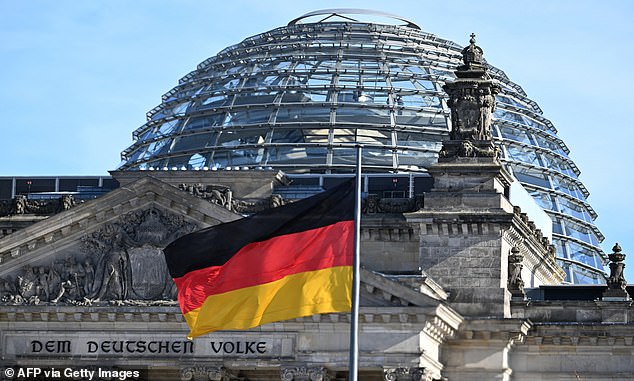A seismic budgetary shift is taking place in Germany at a moment when all eyes are on Donald Trump, tariffs and Ukraine.
The country may still be without a new government post-recent elections, but the two parties likely to form a coalition, the CDU headed by chancellor-in-waiting Friedrich Merz and the centre-Left SPD, are sweeping aside fiscal constraints.
The aim is to jump-start a stagnating economy and fund a big lift in defence spending.
The borrowing and debt deal sent German bond yields rocketing and the euro climbed sharply.
A new €500billion (£418.5billion) industrial investment and infrastructure fund is to be established and defence spending is to be exempted from fiscal rules.
The change is being hailed as Berlin’s ‘do whatever it takes’ moment, similar to when European Central Bank governor Mario Draghi vowed to fix the euro crisis in 2012.

Debt plan: Germany may be without a new government post recent elections, but the two parties likely to form a coalition are sweeping aside fiscal constraints
Donald Trump’s demands that Europe step up defence spending and the threat of a tariff war across the Atlantic speeded up decision-making.
Germany, in contrast to Britain, does not find it necessary to rob Peter (overseas aid) to pay Paul to afford an enormous uplift.
At the end of 2024 Germany’s ratio of debt to national output stood at 62.4 per cent, in contrast to almost 100 per cent in the UK and even higher in France and Italy.
Allowing borrowing and debt to rise means crossing a psychological barrier for German citizens and governments, who still live in fear of the hyperinflation of the Weimar Republic almost a century ago.
The €500billion investment fund – 12 per cent of national output is to be spent over a
decade – is designed to retool Germany, which is suffering a manufacturing meltdown because of a green agenda that has brought the country’s motor industry to a grinding halt.
Defence companies are eyeing under-used car plants and abandoned factories to speed up manufacturing of tanks, radar and weapons.
Rheinmetall, Europe’s top ammunition maker, already has announced plans to take over two plants.
The step-up of investment and defence spending comes as the EU is preparing to mobilise €800billion (£669.5billion) of new resources, including loans, for rearmament.
The Starmer Government may have started in a better place on defence spending but Merz’s ability to harness manufacturing prowess and budgetary space means it could soon catch up.
Germany, unlike the UK, has not allowed its stock market to become a bazaar for private equity and American plunderers who bought brilliant British military technologies on the cheap.
Royal flush
Barely a day passes when there is not good reason to abhor the careless way the Royal Mail owner is being sold to Czech billionaire Daniel Kretinsky.
At the time of privatisation in 2012 the Coalition government recognised the pension liabilities of the service were a poison pill, making it tricky to list the shares.
The Treasury swallowed the assets of the gold-plated, defined benefit scheme, and agreed to land the liabilities on the Exchequer in line with other unfunded public sector schemes.
An analysis of the data by The Daily Telegraph shows the Royal Mail scheme has swallowed £16.5billion of taxpayer funds since 2012. There is a further potential liability of £27.8billion before the plan is exhausted.
The UK decision to take on responsibility for historic Royal Mail pensions is among the many factors which has made the 500-year-old service an easy target for the ‘Czech Sphinx’.
Prospects for the Royal Mail, after it has been loaded up with £3billion of new debt by Kretinsky, are uncertain. Yet taxpayers are on the hook for years to come. Crazy!
Hot chips
Making America great again is complex. Reshoring semi-conductor factories to the US clearly is not part of it.
In his state of the union address US President Donald Trump suggested that Congress rescind the Biden-era £42billion Chips Act and use the remaining funds to pay down debt.
More than half the cash already has been spent, with Biden dishing out billions in his last weeks, including subsidies for Samsung and Taiwan Semiconductor Manufacturing Co.
Never too late to pull up the drawbridge.
DIY INVESTING PLATFORMS

AJ Bell

AJ Bell
Easy investing and ready-made portfolios

Hargreaves Lansdown

Hargreaves Lansdown
Free fund dealing and investment ideas

interactive investor

interactive investor
Flat-fee investing from £4.99 per month

Saxo

Saxo
Get £200 back in trading fees
Trading 212
Trading 212
Free dealing and no account fee
Affiliate links: If you take out a product This is Money may earn a commission. These deals are chosen by our editorial team, as we think they are worth highlighting. This does not affect our editorial independence.
This article was originally published by a www.dailymail.co.uk . Read the Original article here. .


